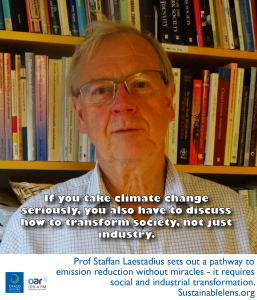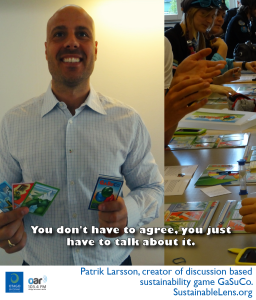If you take climate change seriously, you also have to discuss how to transform society, not just industry but also
transforming life in society so that it will keep providing welfare.
Staffan Laestadius is Professor of Industrial Dynamics. He says his work starts where Climate Change research finishes. He tells us how industrial and societal transformation are inextricably linked. He also tells us that such transformation is possible – a path to emission reduction without miracles.
Talking points
Silent Spring, for me, and many of my generation…that was the first step into sustainability.
Limits to Growth…widely discussed, heavily criticised not least by economists, but also by people who thought this book was something that was telling the the rest of the world now the northern part of the world have got their lifestyle, there is no time, no space for the others to catch up. I think that was the wrong conclusion – I think the Limits to Growth book got too bad a reputation, but many of the forecasts have turned out to be relatively true now.
Industrial transformation…how analyse and understand processes of industrial change.
It isn’t enough to put new fuels in old cars.
The energy transformation required is huge…the elephant in the room, so huge, dramatic and challenging we don’t want to talk about it
We don’t want to talk about what do we have to do to take climate change seriously..but I try to do that.
I try to show it is possible to change
Industrial processes and social change
In Northern Europe we have developed a welfare state, a process modality, people believe that they have got all their welfare, their technology, their cars, and you will not convince people to leave all that to leave all that to go into a stone age economy just to preserve the climate.
You have to show that instead of man as master of nature…to a more circular system that provides a similar or comparable standard of living..that it is the challenge.
Show it is possible without decline in welfare….welfare based on a new sustainability based industrial system
The standard reaction…new technological solutions but from old thinking, linear thinking.
We could have fixed it with these old solutions 50 years ago, but now those solutions are not there any more, we have to be more humble and look to more sustainable solutions.
Now it needs a new way of thinking
There are limits to what we can do
Accepting the planetary boundaries work, my contribution is “What are the consequences for industrial and social transformation?”.
You can’t get people to accept transformation promising that everything will be worse – whether you continue on the same path or accept a sustainable path – so you must find a path of achieving transformation that can provide welfare for society – that is sustainable.
It is easy to fall back to “we’re too small, nothing I do matters”…but a message is the snowball effect – somebody has to go ahead.
We have to show that is possible to transform, increase competitiveness and welfare
To show it is possible we have to break down the enormous task…4 dimensions. 1 half of reductions…2. you should reduce activity levels first, then efficiency…3. it is possible to start, you don’t have to do everything now…4. 4% per year as long as we have growth, intensity is of no interest to nature…so absolute reductions.
We should focus first on doing less of carbon intensive processes
It is possible, but it is tough, because time is running out.
Reduce activity, increase efficiency, then substitution. This is the logical order, but of course they can be worked on together.
This is not a technology revolution…technology is there already…
For the coming years – at least until 2030 we have the technology, it is a political problem to calibrate the system so it becomes politically and socially attractive to join the solution.
Fossil fuels have been so successful, so cheap because externalities ignored
The basic training of economists, externalities so small we don’t have to worry about them. But now we see the basic problem is externalities.
We need to leave 2/3rd of fossil fuel in the ground
Sometimes when I go to sleep I think this is too tough but I think it is worth fighting for
We need to find a pricing model that makes it rational to transform
We need to transform the economy but also to keep the welfare model
(Will the transformation come anyhow?) Stakeholders in old regime…people know more, we have to get politicians to coordinate.
Political leadership is not just doing what they believe the electorate wants, they have to lead in the right direction…climate change a real challenge to traditional left wing/right wing…..we have to find political alliances
(a gentle revolution?) I think this may be necessary in a few years as the climate situation gets worse.
(New book Triple Challenges for Europe) Triple challenges…climate change, economic development, governance.
End austerity politics with investment in green solutions
(Success) not sucess or failure…returning to the synthesis of sustainability in my personal view and work… integrating industrial and social change…a coherent view
Instead of narrowing focus on details of technical transformation, widening scope go more into debate and how to get impact and work with transformation
(Activist) The third task for academics – societal influence – mine is impact on transforming our industrial society. Not an activist. Was when young, but basically I’m an academic.
I wouldn’t say that I’m an activist, but I would say I’m not scared to take a position that is solidly based.
If you take climate change seriously, then you have to work with a transformation…this is the magnitude of the challenge
(Motivation) – I still think I have a lot to do
I have a broader interest…too many things…I work with social, industrial and technology…it keeps me engaged in the debate
(Challenges) Swedish government could agree on transformation of our carbon dependence, way to achieve 4% per annum, and show the world that it is possible.
It will get worse before it gets better.
Maybe we have to face some more disasters and then we can mobilise a transformation
I think it is possible for all of us on an individual level to make the first half…it is possible…the rest will be dificult
I have reduced my car travel to less than half without any problem at all.
I have to do more, and we all have to do more in future, but it is possible to reduce by half with no suffering.



